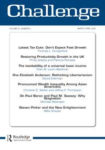This paper is part of a larger project to better understand the limitations of the economic theory of agency and incentives. The economic approach focuses on extrinsic incentives whereas a better understanding of human organization requires an understanding of intrinsic motivation and the complementary or substitutive relationships with extrinsic motivation.
English and Swedish Versions of Swedish ESOP Report
In September 2017, my long-time associate, Chris Mackin, and I did a speaking tour on ESOPs in Sweden hosted by the filmmaker, Patrik Witkowsky, the to-be-lawyer, Mattias Göthberg, and the labor-oriented think tank, Katalyst. Afterwards, Patrik wrote a report, here translated into English, introducing the ESOP idea to a larger Swedish audience and describing the US experience.
New Work for the Visible Hand of Business
This is an essay about the late Richard Cornuelle’s essay “New work for invisible hands” in a commemorative volume of Conversations on Philanthropy.
A Theory of Inalienability: Towards a Theory of Classical Liberal Jurisprudence
This is a draft paper that presents some of the arguments I have been making for years in a framework analogous to Type I and Type II error in statistics–which seems to clarify the arguments. Historically, the sophisticated arguments for slavery and autocratic government were consent-based in terms of implicit or explicit contracts. And the legalized oppression of married women was based on the coverture marriage contract. Hence the critiques developed in the abolitionist, democratic, and feminist movements were not simply arguments for consent as opposed to coercion, but arguments against certain voluntary contracts, e.g., in the form of inalienable rights arguments.
Talk: Neo-abolitionism and Marxism
These are the slides for a talk given in Munich in November 2017 at a conference on the Russian Revolution. The basic argument is that much of what John Stuart Mill said in the middle of the 19th century still sounds radical today. The reason is that Marx, Lenin, and the Russian Revolution set back the Left for a century and a half.
Talk: A Tale of Two Invalid Contracts: Coverture and Employment
These are the slides for a talk that focuses on the parallel inalienable rights arguments against the now-outlawed coverture marriage contract and the yet-to-be-outlawed employment contract.
Review-Essay on Elizabeth Anderson’s “Private Government” book
In her recent book Private Government [2017], Elizabeth Anderson makes a powerful but pragmatic case against the abuses experienced by employees in conventional corporations. The purpose of this review-essay is to contrast Anderson’s pragmatic critique of many abuses in the employment relation with a principled critique of the employment relationship itself.
Listen Libertarians! A Review of John Tomasi’s “Free Market Fairness”
John Tomasi’s 2012 book, Free Market Fairness, has been well received. On the dust jacket, Tyler Cowen proclaims it “one of the very best philosophical treatments of libertarian thought, ever” and Deirdre McCloskey calls it a “long and friendly conversation between Friedrich Hayek and John Rawls — a conversation which, astonishingly, reaches agreement.”
Reframing the Labor Question
Subtitle: On Marginal Productivity Theory and the Labor Theory of Property
This paper reframes the labor question according to the normal juridical principle of imputation whose application to property appropriation is the modern treatment of the old natural rights or labor theory of property.
Labor theory of property and predistribution
This is the online-first publication in Challenge: The Magazine of Economic Affairs of an article on the labor theory of property showing the superficiality of the inequality-debate framing in terms of distribution (i.e., how much is distributed by a firm to labor versus capital) in favor of a framing in terms of what is now called “predistribution”–in this case the question of who is to be the firm in the first place, Capital or Labor.





